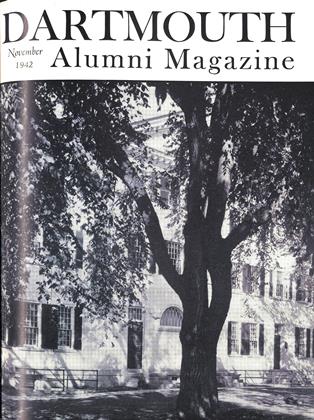MR. CHIPS" AND THE "SPARROW" have retired.
After 46 years as schoolmaster extraordinary, Paul Rockwell Jenks '94, known to generations o£ Long Island high school students as"Mr. Chips," has bid farewell to teaching Latin and Greek, and, with his mythical friend, the all-seeing, all-knowing "Sparrow," has left the classroom forever.
Beloved by all, Mr, Jenks is well-known on Long Island's North Shore as author, mountain climber, trail blazer, and the dean of local high school teachers.
Paul Jenks graduated from Dartmouth in 1894. He was Phi Beta Kappa, had honors in Greek and mathematics, and was salutatorian of his class. His teaching career began in the Plymouth, N. H., Normal School where he taught Greek, Latin, and ."everything else." In February, 1901, he became instructor in Latin and Greek at Boys' High School in Brooklyn.
Then, in 1907, Mr. Jenks took up his duties at Flushing High School. He has remained there for 35 years as chairman of the Latin department and has served as Acting Principal four times since 1925. He coached his school's tennis teams for eighteen years during which they won ten championships of Queens Borough and two of New York City high schools. He never took sabbatical leave, and, except for deaths in his family, was absent from duty on only two occasions.
A prototype of James Hilton's beloved schoolmaster, Mr. Jenks is slender, bespectacled, has stringy iron-gray hair, a wispy moustache, and twinkling eyes. Yet, in spite of the latter, he was considered the strongest disciplinarian on the faculty.
For many years the "Mr. Chips" of Flushing has been enlivening his classes with jokes, stories, and quips. He was conducting "double or nothing" quiz programs long before they became a feature on the radio, and always rewarded students outstanding in their lessons. True, the prizes were usually pennies, but his $64 Latin sticker question rated a nickel.
"When I look back," he said, "I feel proudest of 1931 and 1933. Those were years when I was Acting Principal and my Flushing students broke all previous records in state examinations." Of the Dartmouth students who passed through his hands the average rank was nearly, if not quite, that of Phi Beta Kappa.
Mr. Jenks has more than a classroom interest in young people. During recent years he has been vestryman of old St. George's Episcopal Church, Flushing, and instructor in its church school and sponsor of its young people's activities. It was under his guidance that the "DeMasi-Smith" fund was raised in memory of the two Flushing boys who perished in the Dartmouth fraternity tragedy of 1934. The fund has perpetuated the memory of the two boys and furnished the school's most coveted award.
A word here about the "Sparrow." This legendary fowl is said to have seen through any ruse and would whisper his information into the ear of Professor Jenks. Many a Flushing student, on failing to recite, has squirmed in his seat as Mr. Jenks remarked, "The Sparrow tells me you frittered away your time instead of studying."
Besides his teaching and writing—he is the author of three Latin textbooks for high schools—Mr. Jenks has been secretary of the Trails Committee of the Appalachian Mountain Club for 20 years. In practice that meant that he, more than any other one person, was responsible for the growth and maintenance of a trail system of more than goo miles. In 1919 he was made the first president of the New England Trail Conference, although he had lived in Flushing for the 18 years previous.
One of his favorite hobbies is painting trail signs for the A. M. C. During the winter months he makes more than 175 of these signs which are placed throughout the White Mountains. Recently one of his signs was placed at the foot of Mt. Washington, and another at the summit, commemorating the 300 th anniversary of the first ascent of the mountain. (For a description of this first ascent, see the article im mediately following.—Ed.)
Mr. Jenks is a very modest person, and would allow no fanfare or festivity to attend his retirement. A quiet summer at his cottage at Whitefield, N. H., was all he asked for. "From the porch I'll be able to see the White Mountains and the sun rise and set," he said. "To me, that will be living all over again."
 View Full Issue
View Full Issue
More From This Issue
-
 Article
ArticleThe American Dream: Growth of a Nation
November 1942 By KENNETH ALLAN ROBINSON -
 Article
ArticleCollege Finances Sound
November 1942 -
 Class Notes
Class Notes1918*
November 1942 By ERNEST H. EARLEY, DONALD L. BARR -
 Class Notes
Class Notes1936*
November 1942 By NORBERT HOFMAN JR., JOHN E. MORRISON JR. -
 Sports
SportsBig Green Teams
November 1942 By ELMER STEVENS JR. '43. -
 Sports
SportsTHOSE WERE HAPPY DAYS
November 1942 By Jack Childs '09








